
Organized by the China-Africa Business Council (CABC), the 2020 China-Africa Private Sector Cooperation Forum took place in Beijing, China, on 11 December 2020, with a focus on industrial and trade cooperation between China and Africa in the context of the COVID-19 pandemic. Participants substantiated the growing importance of the private sector in China-Africa South-South cooperation with quantitative evidence and case studies, and shared observations on key areas and trends of the cooperation.
South-South cooperation has expanded from technical cooperation to economic, trade, financial cooperation in recent years, because of the strong momentum in economic development and cooperation in the global South, especially the increased investment and trade cooperation. The Outcome Document of the Second High-level United Nations Conference on South-South Cooperation (BAPA+40), held in Argentina in 2019, highlighted the expanded scope of SSTC which includes South-South trade and investment; and acknowledged the roles played by multi-stakeholders, including the private sector, in promoting South-South and triangular cooperation (SSTC) for sustainable development.
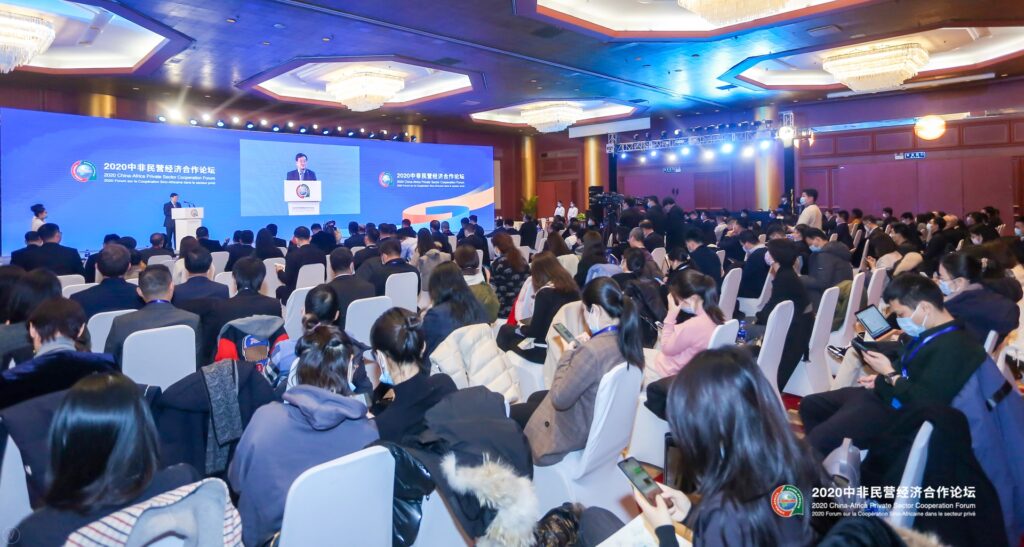
Participants at the Forum. Source: China-Africa Business Council (CABC)
China-Africa cooperation has been spearheading South-South cooperation. At the United Nations Security Council High-level Debate on “Cooperation between the United Nations and Regional and Sub-regional Organizations with a Specific Focus on the United Nations and the African Union” on 4 December 2020, Chinese Foreign Minister Wang Yi said, “China stands as a true friend of African countries and a partner with common purpose. Guided by the principle of sincerity, real results, amity and good faith, China has put the greater good of African countries above its own interests. We are always ready to play a part as the African people pursue their grand vision of development.”
Mr. Xu Lejiang, Executive Vice Chairman of the All-China Federation of Industry and Commerce shared that this year marked the 20th anniversary of the founding of the Forum on China-Africa Cooperation (FOCAC), which had earned worldwide attention to the cooperation between China and Africa. He further stated that, “the trade between China and Africa exceeded USD200 billion in 2019, which 20 times the number of 2000; China’s direct investment in Africa reached USD49.1 billion in the same year, which is 100 times higher than that of 2000, making China the largest trading partner of Africa for the 11th consecutive year. Contributing to over 20 per cent of the African economic growth for many years, China has become a critical driver of the sustained economic growth of the continent.
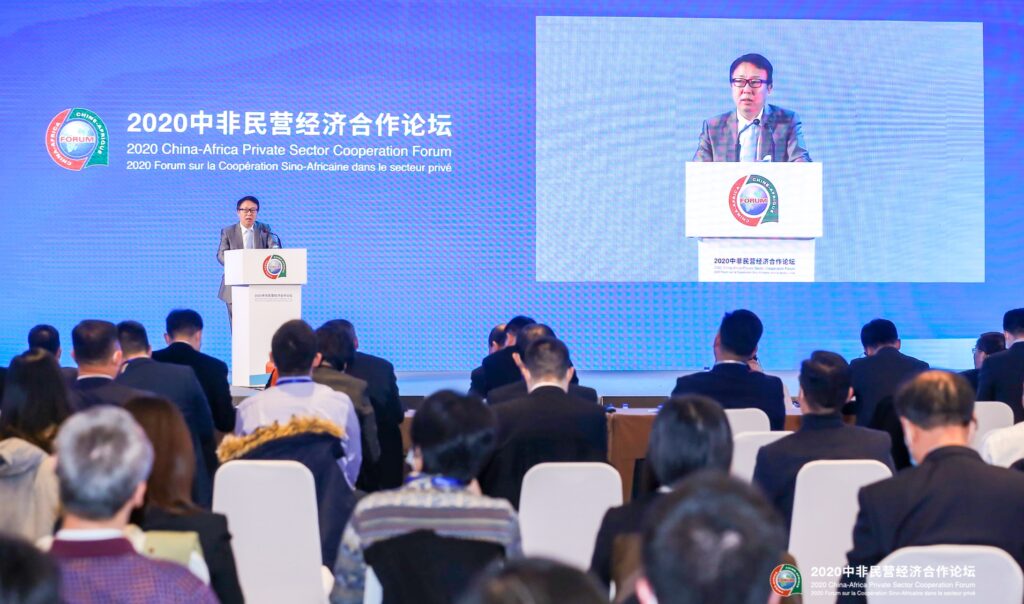
Mr. Wu Peng, Director-General of the African Affairs Department of China’s Ministry of Foreign Affairs delivering a speech at the opening ceremony of the Forum. Source: CABC
Mr. Wu Peng, Director-General of the African Affairs Department of China’s Ministry of Foreign Affairs said, “as a sub-forum under the FOCAC framework, the China-Africa Private Sector Cooperation Forum has evolved as an important platform and flagship event for Chinese and African private businesses to communicate and cooperate. The Forum is held on schedule despite COVID-19 challenges. Such demonstrated the willingness and commitment of both China and Africa to promote cooperation and joint development.” Looking ahead, Mr. Wu shared that cooperation and development would remain the top priority on the agenda of China-Africa cooperation and the next Forum to be held in Senegal in 2021 would certainly boost China-Africa cooperation in the post-pandemic era and offer Chinese and African private businesses more opportunities.
Mr. He Song, Deputy Director-General of the West-Asia and Africa Department of China’s Ministry of Commerce noted that, according to China’s Ministry of Commerce, the private sector makes up over 70 per cent of China’s investors and investments in Africa, making it a leading force in China’s investment in and cooperation with the continent. Projects contracted by Chinese businesses in Africa from January to October 2020 saw a 34 per cent increase in value, greater than any other regions they invested in, indicating the resilience of economic and trade cooperation between the two economies. In his view, the development of Africa presented new opportunities: first, accelerated regional integration, as a result of the commendable joint efforts made by African countries to tackle the coronavirus; second, faster economic diversification which has made economic self-reliance more important than ever; third, emerging industries which has seen new opportunities arising from the forced reforms in traditional industries during the pandemic.
Dr. Hany Besada, Senior Research and Programme Advisor to the United Nations Office for South-South Cooperation (UNOSSC) highlighted in his video messages that Chinese businesses had increasingly changed from pursuing short-term development projects to developing strategies based on local conditions in Africa for a mutually-beneficial sustainable partnership in a bid to achieve their own development while supporting local economic and social development and contributing to industrial upgrading, job creation, tax increase, and poverty relief.
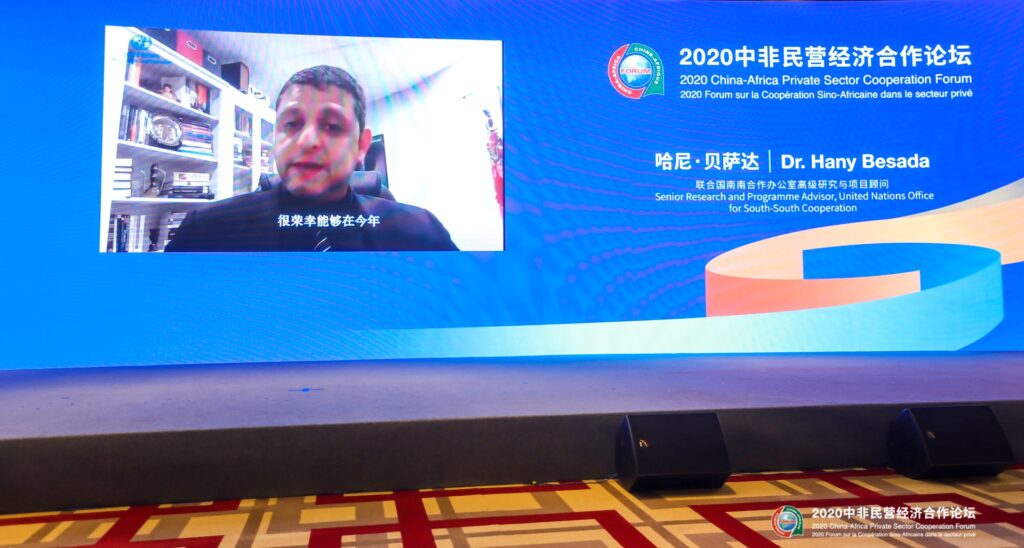
Video message by Dr. Hany Besada, Senior Research and Programme Advisor, UNOSSC. Source: CABC
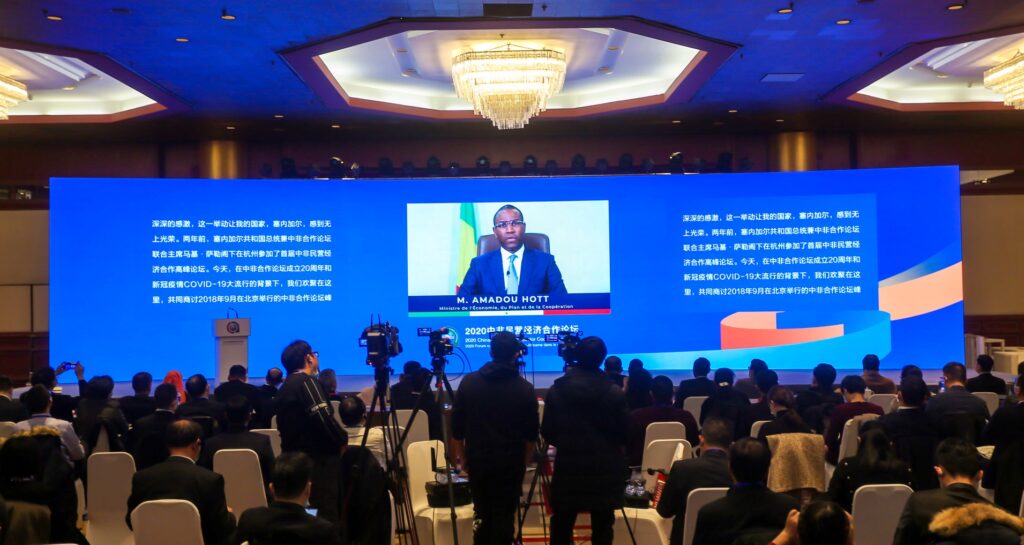
Video message by Mr. Amadou Hott, Minister of the Economy, Planning, and Cooperation of the Republic of Senegal. Source: CABC
Mr. Amadou Hott, Minister of the Economy, Planning, and Cooperation of the Republic of Senegal underscored in his video message that, the Forum was not only a good opportunity to enhance friendly exchanges between China and Senegal, but a part of Senegal’s efforts to accelerate economic and social development. The cooperation in commerce, industry, medical care, and pharmaceuticals between China and Africa could potentially fuel economic recovery of Senegal and has been incorporated in Senegal’s Adjusted and Accelerated Priority Action Plan.
Mr. Albert Muchanga, Commissioner for Trade and Industry of the African Union Commission shared that, Africa had been endeavoring to achieve green and inclusive industrialization, and working together with the United Nations Industrial Development Organization (UNIDO) to complete the construction of commercial hubs across Africa by the end of 2020. These hubs would promote industrial specialization and avoid unnecessary competition.
Economic Counselor of Ethiopian Embassy in China Ms. Munteha Jemal introduced four potential priorities of China-Africa cooperation: first, the prevention and treatment of malaria, AIDS, and other major diseases including infectious ones in addition to COVID-19; second, health and sanitary facilities; third, research and development of both traditional and new medicine; and fourth, increased investment in medical care and pharmaceuticals in Africa by China, given that up to 90 per cent of Africa medical products are currently imported.
Mr. Wang Licheng, Chairman of the China-Africa Business Council (CABC) and Holley Group underlined in his keynote speech that, the CABC would engage with the UN and other international organizations as well as the Chinese and African governments, to help Chinese and African businesses join hands for mutual benefits and win-win results, and, in particular. to mobilize at least USD10 billion investment from Chinese businesses to Africa in the next three years.
The opening ceremony was followed by moderated discussions by 12 Chinese and African government officials, experts, scholars, and representatives of the private sector, on potential cooperation and opportunities in Chinese-African industry and trade, China’s contribution to African industrialization, and new trends of China-Africa medical and pharmaceutical cooperation and China’s contribution to African livelihood. Participants from the private sector introduced their efforts made to help Africa respond to the pandemic.
The Forum was attended by more than 10 African diplomatic envoys and over 150 representatives from Chinese and African government departments, academia, think-tanks, financial institutions, and the private sector, and joined by over 100,000 viewers from the Chinese and African business communities online.
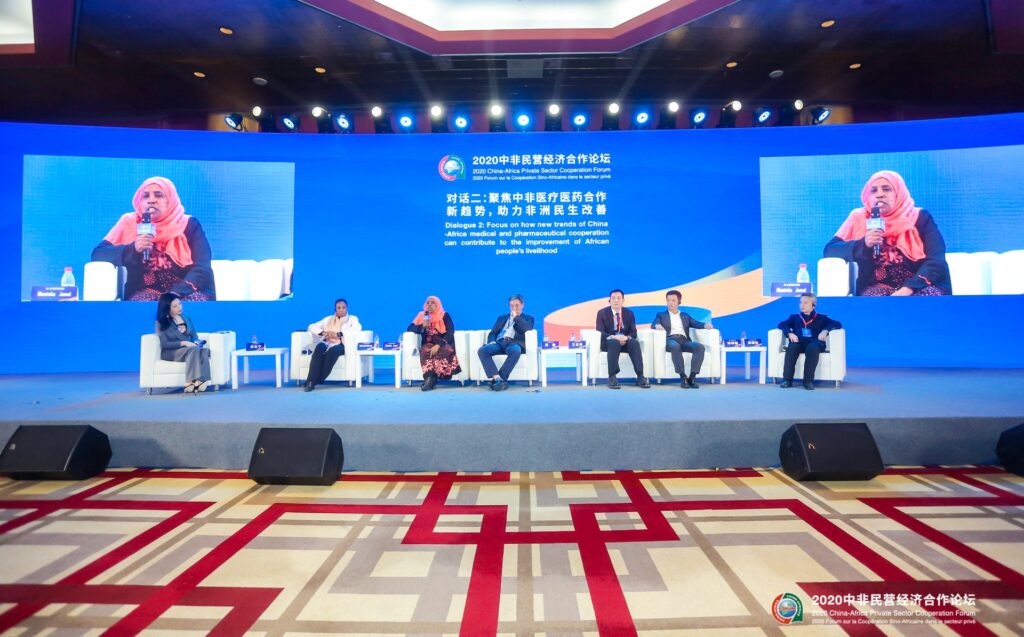
Moderated discussion on new trends of China-Africa medical and pharmaceutical cooperation and China’s contribution to the improvement of African people’s livelihoods. Source: CABC

The small-grant project “Promoting Africa’s Broadcast Television Dubbing Skills” implemented by CABC AND featured in Good Practices in South-South and Triangular Cooperation for Sustainable Development – Volume 2. Source: CABC
CABC is a result achieved jointly by the China International Center for Economic and Technical Exchanges (CICETE) and the United Nations Development Programme (UNDP). It is the first public-private partnership programme jointly initiated by the Chinese government and the UN under the framework of the South-South cooperation, and an important partner of the Global South-South Development Center Project (Global SSDC Project). Over the past decade and more, CABC has made numerous achievements in China-Africa industrial cooperation. Members of CABC have employed 107,400 local people in Africa, facilitated local industrial development, and created more than 1.6 million jobs for the continent. In the second and third volume of UNOSSC’s publication Good Practices in South-South and Triangular Cooperation for Sustainable Development, several CABC initiatives were included to represent the contribution made by the private sector to the South-South cooperation between China and Africa.
Supported by the Global SSDC Project and hosted by the CABC, the Seminar on China-Africa Private Sector Cooperation was held in the same day. As an important part of the Forum, the Seminar was attended by experts from the Center for International Knowledge on Development (CIKD), the China-Africa Development Fund (CADF), the Project Office of the UNIDO Centre for South-South Industrial Cooperation, and the South-South Cooperation Research Center of Nankai University. Participants exchanged ideas over international business cooperation, China-Africa cooperation in investment and financing, industrial parks, and China-Africa production capacity cooperation. The Seminar was also joined by over 120 guests from the embassies of developing countries in China, local trade promotion councils, financial institutions, chambers of commerce, guilds, investors in Africa, and young entrepreneurs.

Division Chief from the China International Center for Economic and Technical Exchanges Zhang Wei moderating the Seminar. Source: CABC

The Seminar. Source: CABC

Knowledge products for participants of the Seminar. Source: CABC
The Global SSDC Project was jointly initiated by UNOSSC and CICETE and hosted by CICETE. The project team has scheduled to organize online and offline capacity building workshops and seminars, as platforms for thematic research and discussions as well as knowledge sharing by experts from various sectors, to ultimately accelerate the innovation of South-South cooperation and international development cooperation.
The China-Africa Business Council is registered on South-South Galaxy. To visit their profile and connect, please click here.
